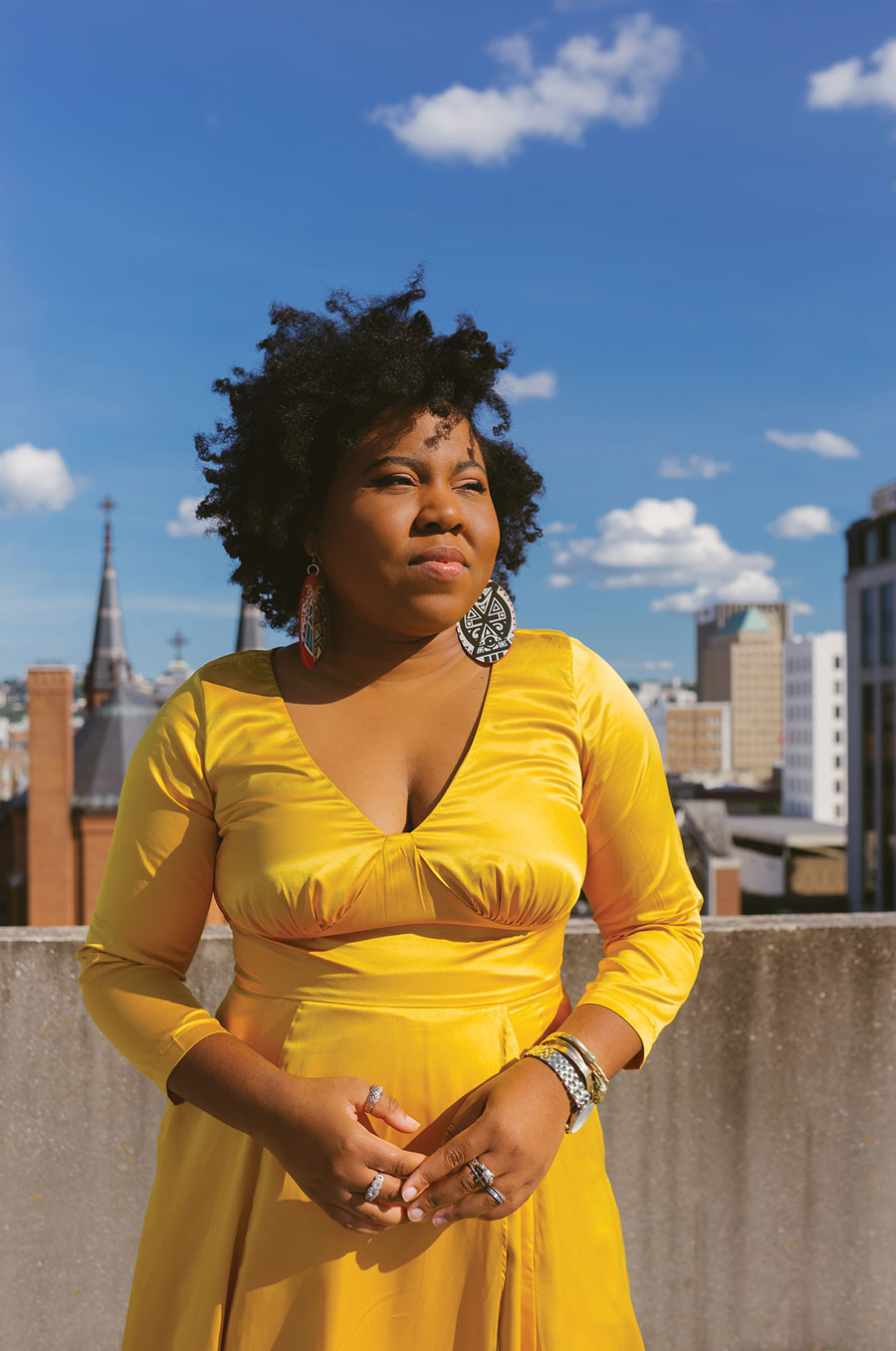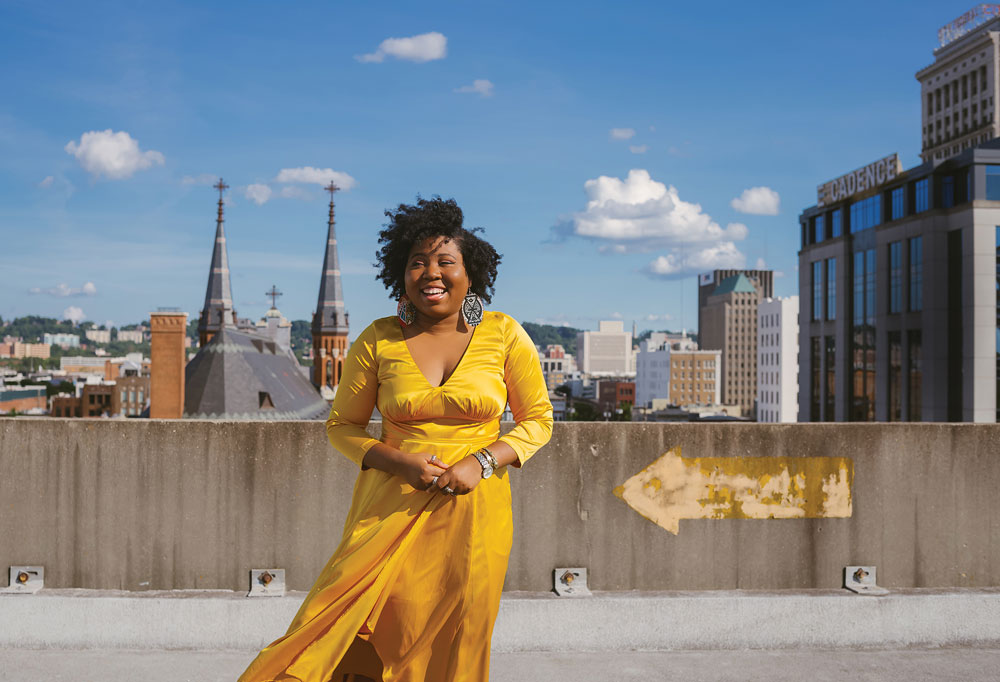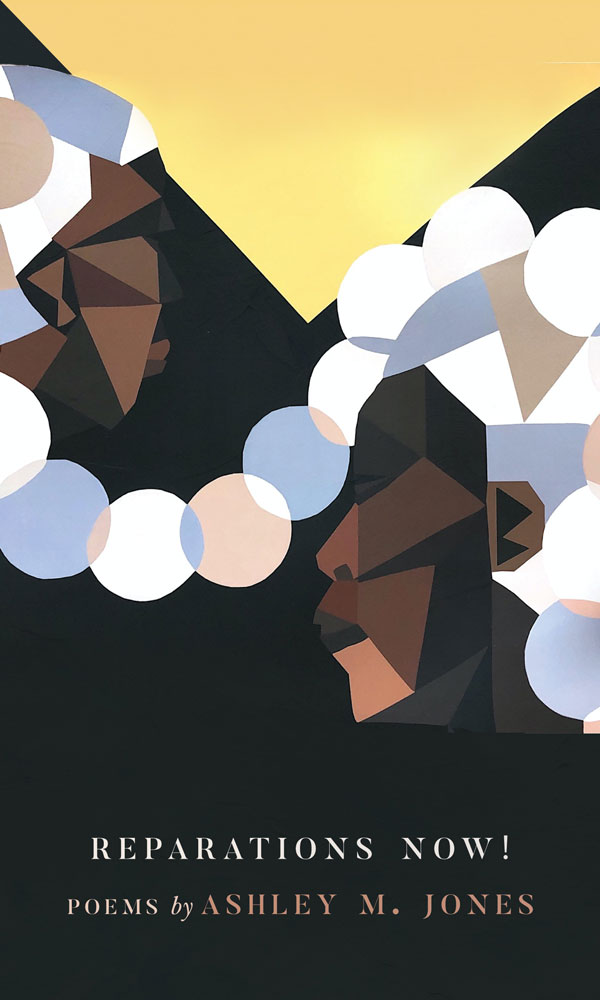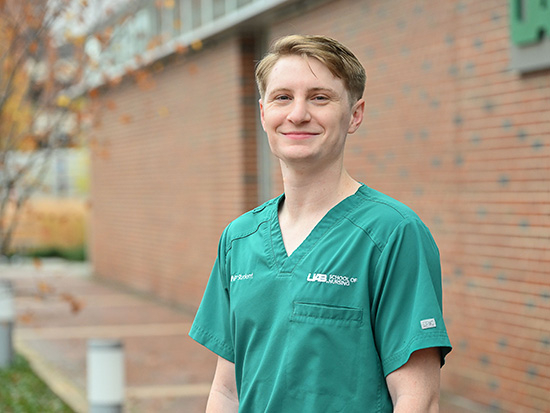 Alabama Poet Laureate Ashley M. Jones. Photos by Miyako StudiosCreative people often seek out safe spaces where they can express themselves and connect with others. These spaces can take many different forms: nature, studios, classrooms. For Ashley M. Jones—UAB alumna and Alabama’s 13th Poet Laureate—engaging with and advocating for access to such spaces is an essential part of her story and her vision for the state of Alabama.
Alabama Poet Laureate Ashley M. Jones. Photos by Miyako StudiosCreative people often seek out safe spaces where they can express themselves and connect with others. These spaces can take many different forms: nature, studios, classrooms. For Ashley M. Jones—UAB alumna and Alabama’s 13th Poet Laureate—engaging with and advocating for access to such spaces is an essential part of her story and her vision for the state of Alabama.
Creativity at Home
Jones’ creative journey began at home, in Birmingham, when she was a toddler. Whether she was singing, painting, or watching public television (especially “Lambchop’s Play-Along” and “The Lawrence Welk Show”), she constantly found opportunities to exercise her creative voice.
“I’ve been creative for as long as I’ve been alive,” said Jones. “A lot of that has to do with my family—my parents were very focused on making sure we were educated well and that we had time and space to be creative.”
Throughout her childhood, she had access to hands-on learning experiences at home. She and her three siblings participated in daily lessons designed by their mother, which included unconventional toys ranging from a box with shoelaces to homemade Play-Doh.
“There was an air of learning in our house,” said Jones. “From that early age, I was content to create things out of my own mind. I also loved reading books—I’d reread the same book over and over sometimes.”
An EPIC Next Step
Her creativity and love for reading proved to be sources of strength as she later navigated two of Birmingham’s most dynamic schools: EPIC Elementary and the Alabama School of Fine Arts.
While attending EPIC, Jones witnessed the power of creativity in a truly inclusive space. “It taught me that differences are useful and that they are to be celebrated,” said Jones. “It was a very inclusive and supportive environment, and it was very focused on creation.”
That focus on creation prompted Jones and her classmates to collectively explore their interests and talents. Through that exploration, Jones found herself drawn to creative writing and making books.
“I remember in first and second grade we were making books,” said Jones. “I really have been focused on creation from an early age. I learned that I wanted to write by making those books at school… I decided early on, ‘Okay, I’m going to be a writer. I’m going to write novels.’”
EPIC was located next door to an institution that would later play a significant role in Jones’ life: the University of Alabama at Birmingham. As an elementary school student, Jones never explored UAB’s campus, though.
That changed when she enrolled in the creative writing program at the Alabama School of Fine Arts (ASFA), a tuition-free arts and sciences school in downtown Birmingham that serves grades 7-12. At ASFA, she continued learning and writing in a supportive environment, and, in her junior year, one of her teachers took her on a tour of UAB.
“We toured the University Honors Program (UHP). I remember that piquing my interest,” said Jones. “I wasn’t aware that there was this enclave where I could seamlessly transition from ASFA to another small, specialized program.”
Finding Her Place at UAB
Jones saw UAB as both a large, public institution and a place where students could feel at home. That combination was attractive to her. In addition, her older sister was already attending the university, and Jones knew she could look to her for support and guidance. So, after careful deliberation and consideration, Jones made the leap and enrolled at UAB. The minute she stepped foot on campus as a student, she knew she’d made the right decision.
“I felt like I fit immediately,” said Jones.
She was quick to seek out opportunities and spaces to exercise her creative talents, while developing new skills that she could leverage after graduation. She participated in the Multicultural Scholars Program—an academic program designed to support the recruitment and retention of underrepresented students—and served as an editor for Aura Literary Arts Review, a literary magazine published by UAB Student Media. Also, she was a member of the UHP. Through UHP, she found a close-knit community and a group of caring mentors—including Mike Sloane, Ph.D., the director of UHP and an associate professor in the Department of Psychology.
“Ashley was a multi-talented undergraduate who excelled academically but was also immersed in extracurricular activities both within UHP and at UAB in general,” said Sloane. “She held some high-profile leadership roles in UHP and at UAB. Her maturity, dedication, and singularity of purpose were simply infectious. She was a true servant-leader.”
“I’ve been creative for as long as I’ve been alive.” — Ashley M. Jones
Along with her many affiliations and extracurricular activities, Jones was also a stellar English major. Through the Department of English, Jones participated in creative writing workshops where she continued to nurture her talent for crafting poems. Within no time, Jones was publishing her writing in Aura and Sanctuary—the honors program’s literary and arts journal—and receiving formal recognition for her work. In 2009, she earned First Place in Original Poetry at the Mersmann Awards, and, in 2011, she received the Gloria Goldstein Howton Creative Writing Scholarship.
Along the way, she received significant support and mentorship from one faculty member in particular: James Braziel, associate professor in the Department of English.
“When [James] came to UAB, I found somebody who I could depend on, who believed in my work,” said Jones. “He made room for me. He allowed me to explore creatively in whatever way I needed to. He’s still a very close friend of mine today.”
James was not the only Braziel with whom Jones connected. She also worked alongside Tina Braziel, James’ spouse and director of UAB’s Ada Long Creative Writing Workshop.
The Ada Long Creative Writing Workshop is sponsored by the Department of English and consists of a multi-week creative writing experience where high school students get to work closely with well-known authors. While working with Tina on the workshop, Jones learned how to manage and direct an arts-focused program, a skill that would prove to be valuable years later when Jones founded the Magic City Poetry Festival. According to Tina, throughout Jones’ experience with Ada Long, she embraced opportunities for young people to express themselves creatively.
“As a volunteer and, later, as a coordinator for the Ada Long Creative Writing Workshop for high school students, Ashley took great care to help our students express what they intended clearly without imposing her ideas into their work,” said Tina.
Connecting with Sonia Sanchez
In addition to expressing herself creatively and empowering young people to do the same, Jones was discovering scholarly research for the first time through UAB’s Ronald McNair Scholars Program, a program that aims to increase the attainment of Ph.D. degrees by students from underrepresented communities. Specifically, Jones—who was one of the only English majors in the program—worked on a research project with Jacqueline Wood, Ph.D., former associate professor in the Department of English, that exposed her to a groundbreaking and world-renowned writer who served (and continues to serve) as a major source of inspiration: Sonia Sanchez.
Sanchez was born in Birmingham and has published numerous books, plays, and volumes of poetry, including Homegirls and Handgrenades, which won an American Book Award. Through her research, Jones dove deep into Sanchez’s life and work, collecting over 1,000 articles about her. The project would come full circle several years later with Jones meeting and befriending Sanchez. The two met because Sanchez selected Jones for the 2019 Lucille Clifton Legacy Award from St. Mary's College of Maryland—it was an experience and honor that Jones could barely fathom during her undergraduate years.
“I never imagined sitting in the library at UAB, collecting all of these articles…that I would get to meet her,” said Jones. “To know that I’m in community with her, I never would've imagined that could happen. In my mind, that first [research] experience at UAB kind of opened me up and set me up for a future I didn’t know existed.”
While learning about Sanchez and looking to the future, Jones’ love for poetry continued to flourish. And, in turn, poetry began to reveal things to Jones. As she puts it, “Poetry has a unique ability to force us to see ourselves.”
The Power of Poetry
Jones describes her poetry in terms that are both powerful and personal. When she writes a poem, she “sees a part of my own humanity that maybe I haven’t seen before,” said Jones. “I think there’s a lot of empathy that can be created through reading and writing poetry and even self-love can be created.”
Poetry gives us space to reflect and play, says Jones. “It gives you a chance to process something you haven’t been able to process before.”
Given her deep connection to and love for poetry, it’s no surprise that Jones pivoted her long-term goal from writing novels to writing collections of poetry. With that in mind, after graduating from UAB in 2012, she enrolled in the Master of Fine Arts (MFA) program at Florida International University (FIU).
Jones thrived at FIU. She received recognition for her work from groups like the Academy of American Poets and served as a John S. and James L. Knight Foundation Fellow. Although she appreciated her time at FIU, she often thought about Birmingham. She wanted to use her talents to make a positive impact back home in her community. After graduating in 2015, she found an opportunity to return to her hometown. The opportunity? Teaching creative writing at ASFA.
When she returned to Birmingham to teach, she was determined to continue writing and sharing her poetry while also advocating for access to art in both the classroom and the community.
“I really, really believe that everyone deserves the opportunity to create art or to have access to art and to not be judged for their art,” said Jones.
 Becoming Poet Laureate
Becoming Poet Laureate
Now, she is prepared to take that vision a step further in her role as Alabama’s newest Poet Laureate (2022-2026). According to the online Encyclopedia of Alabama, Alabama’s Poet Laureate “serves as the public face of poetry for the state,” often sharing poems in public spaces ranging from classrooms to libraries.
The position was created in 1930 and, for the past 90 years, the governor has commissioned each Poet Laureate.
Jones is the first Black person to serve in the role and the youngest Poet Laureate in the state’s history. Given her impressive creative output and accolades in recent years, the prestigious designation come as no surprise.
Over the past decade, she published three poetry collections—Magic City Gospel, dark//thing, and REPARATIONS NOW!—and received numerous awards, including the 2015 Rona Jaffe Foundation Writer’s Award and the 2018 Lena-Miles Wever Todd Prize for Poetry from Pleiades Press. Her work has been featured on CNN, in the Academy of American Poets, and in POETRY. According to Jones, being Poet Laureate is about more than publishing and sharing her work, though. She wants to turn attention to other artists across the state, while advocating for more access to creative spaces and opportunities in every corner of Alabama.
“I want to create space for those who maybe haven’t stepped out yet who are working in secret… to come out into the light and see that there's a supportive community around them,” said Jones. “I am really committed to bringing resources to all communities in our state. Organizing a community around poetry can be hard.”
Engaging Communities
She plans to accomplish her goal by distributing arts funding to five regions evenly divided across Alabama. That said, she does not plan to stipulate how the grants will be spent—instead, she wants local communities to make decisions about how to invest the money.
“I want the funds to be there for their use and not dictated by me,” said Jones. “I think this is a service position. It’s my job to promote poetry, yes, but also to serve the community. They already have agency and power and knowledge of themselves.”
Jones has found several additional ways to promote poetry and creativity alongside her role as Poet Laureate. She co-directs the Birmingham Chapter of PEN America, a nonprofit organization that “works to ensure that people everywhere have the freedom to create literature, to convey information and ideas, to express their views, and to access the views, ideas, and literatures of others.” Also, she regularly tours the state (and country) sharing her poems, and she is the founder and executive director of the Magic City Poetry Festival—a Birmingham-based celebration that highlights poetry, history, nonprofits, and culture workers. And she still teaches at her alma mater, ASFA—the position that brought her back to Birmingham.
In the Classroom
Through her role as a teacher, Jones believes she is in a position to offer the same life-changing educational and creative experiences that were so valuable to her as a young person. Given that significant responsibility, she is committed to using inclusive curriculum while creating space for students to express themselves creatively.
“It's important for me that my students see themselves reflected in the curriculum,” said Jones. Specifically, she wants her students to see examples of writers that look like them, so they can open up and be more vulnerable.
And, of course, Jones herself serves as a profound example for her students.
She notes that, early on, she avoided disclosing much about her work outside of the classroom. Then, she quickly realized that young people are very adept at conducting research online.
“They find out everything,” said Jones.
Now, she embraces their collective awareness of her role as Poet Laureate. “You cannot get anything past them,” said Jones with a smile. “They said, ‘We want to celebrate! We want to be proud [of you].’ I've learned from them that it is important for me to be myself—the author, the Poet Laureate, the human—alongside my students so they can see that it’s possible.”
And that’s exactly what she’s doing—showing her students and the people of Alabama what is possible when you share your creative voice openly with others.
“GOD MADE MY WHOLE BODY”
 and the way it moves, and the way it shakes and jiggles and plops, and
and the way it moves, and the way it shakes and jiggles and plops, and
God made my smile and the thousand tears that fall from my eyes, God
made the sun and the moon and the leaf held loosely in my godson’s
perfect little hand, and God made the summer breeze and the guitar
Ron Isley crooned over, and God made the grass and the bugs and the
dogs and the trees, and God made all of our bodies to make waste, and
God made even the waste that lives in us, and God made the way the
world spins and the way it will shake us right off if we don’t act right,
and God made the rivers which make it possible for us to drink, and
God made the clouds which hold the rain, and God made the birds
which fly and the wolves that howl. God made the folds of my brain
and the thoughts that burrow there. God made my belly, my uterus and
all the little eggs which might become children—God made the doubt
that rests there, like bubbling gas. God made the silence I wrap around
myself some nights, alone. God made the music we sing and the music
we hate. God made the ears which help us stay balanced, help us to
hear what people say behind our backs and in front of them. God made
sweet potato pie and aunties and mamas who know how to add
just enough nutmeg. God made my whole body. And God made my
grandma and her gold tooth, and God made my grandma and her curly
wig, and God made my grandma I didn’t know, and God made my
grandpa who was a ghost, and my grandpa who was a terror. God made
fear and the way it slices us up thin and flimsy, God made the way a
hand quivers before it strikes. God made pain. God made the blood
which runs and keeps us running. God made an everlasting red.
By Ashley M. Jones
From Reparations Now! Hub City Press, 2021


